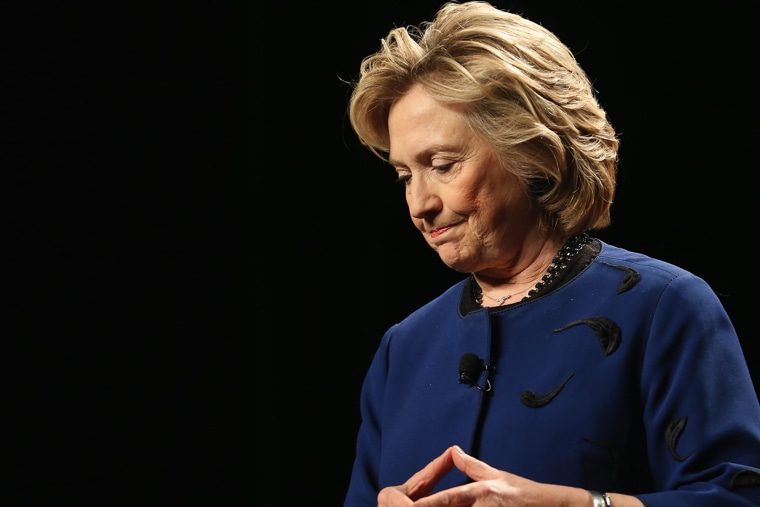When Hillary Clinton takes the stage Sunday in Iowa, it will the culmination -- at least for now -- of the former secretary of state’s long, complicated relationship with the state.
She has often spoken about her experience on her husband’s two successful presidential campaigns, but Iowa was the one place Bill Clinton did not campaign in 1992, since Sen. Tom Harkin, who is hosting this weekend’s Steak Fry, ran for the Democratic nomination as a favorite son that year. “Luckily, the primary campaign would shorter and more focused than usual,” she writes in her 2003 book “Living History,” "which meant we could bypass Iowa.”
In 1996, Clinton was able to bypass Iowa's first in the nation caucuses again -- as the incumbent president, he didn’t have a competitive campaign to reclaim the nomination.
Barack Obama's 2008 campaign, which put all its chips on Iowa, saw an opening in Hillary Clinton’s lack of familiarity with the state. “We thought Iowa could be potential quicksand for Hillary. Bill Clinton never campaigned there,” David Plouffe, Obama’s 2008 campaign manager, wrote in his book "The Audacity to Win." “None of her core senior team had any Iowa experience whatsoever.”
The first big sign of danger came in the first quarter of 2007 when Obama, then considered a huge underdog against Clinton for the nomination, pulled in shockingly massive fundraising haul. The picture only got worse for Clinton upon closer inspection, when it became clear that the then-Illinois senator had greatly outraised his better known opponent in terms of funds that could be spent in the Democratic nominating contests. Until then, it was assumed that he was no match for Clinton’s vaunted fundraising apparatus.
Not long after, her campaign was rocked when a memo leaked to the press from Deputy Campaign Manager Mike Henry suggesting that Clinton skip the state and move on to New Hampshire and the bigger upcoming contests, which would better play to her strengths.
In a state that prides itself on getting personal attention from candidates, the memo went off like a bombshell and forced Clinton to double down on the state.
"I am unalterably committed to competing in Iowa," she told the Associated Press after it leaked. And indeed she worked doggedly in the state, holding more campaign events per day than Obama did and far outspending him.
“The problem with the campaign in 2008 in general was that she wasn't connecting with Iowa caucus goers, and the memo just played into that,” Norm Sterzenbach, the former executive director of the Iowa Democratic Party, told msnbc.
There were better moments for Clinton to come. In the fall of 2007, she fired up a crowd of cheering fans waving “Hillary” signs at the Harkin’s annual Steak Fry with the other candidates. The next day in Des Moines, she unveiled a new universal health care plan, which became a standard that the other Democratic candidates had to meet. And in December, she would receive the coveted endorsement of The Des Moines Register.
Clinton had started the campaign with a huge lead in the polls over the rest of the field, but Obama continued eating away at her advantage into the fall in Iowa heading into one of the biggest events of the year.
The annual Jefferson-Jackson dinner is always about Democratic politics, and especially so two months before the state's nominating caucuses. Obama clearly outmaneuvered Clinton at the event -- her team was slow to buy tickets and stack the room with supporters, and her speech came together late, striking a poor contrast with Obama’s well-honed and dramatic remarks.
“Should he win the Iowa caucuses, Saturday’s dinner will be remembered as one of the turning points in his campaign in here, a point where he laid down the marker and began closing on Clinton, the national frontrunner,” Des Moines Register columnist David Yepsen wrote at the time.
It turned out be prescient.
In the final weeks before the primary, Clinton tried to counter notions that she was too cold by launching what some dubbed a “likeability tour,” trotting out friends and constituents from New York to vouch for her.
Of course, it didn’t work out in the end and she came in third on Iowa Caucus night in January. The experience was “excruciating,” she writes in her new memoir, “Hard Choices.”
Clinton returns to Iowa this weekend in a much stronger position. A new CNN/ORC poll out Friday shows her with support from 53% of registered Democrats in Iowa. Her closest competition, Vice President Joe Biden is way behind at 15%.
Even so, she’ll still have contend with Iowa Democrats, who want to see a competitive race.
